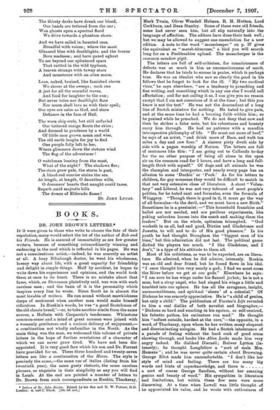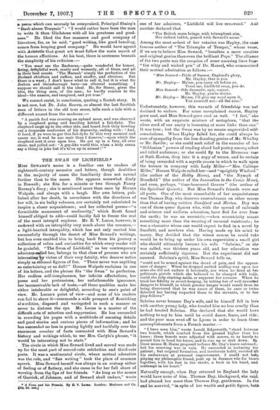BOOKS.
DR. JOHN BROWN'S LETTERS.*
Is' it were given to those who write to choose the fate of their reputation, many would select the lot of the author of Bab and his Friends. He is assured of immortality as are few greater writers, because of something extraordinarily winning and endearing in the soul which is reflected in his pages. He was not a conscientious artist,—indeed, he was scarcely an artist at all. A busy Edinburgh doctor, he went his wholesome, breezy way about life, with a great capacity for friendship and delight in simple things. Half by accident, he began to write down his experiences and opinions, and the world took them at once to its heart. There is no mistake about that fame, which, as Stevenson plaintively said, was won with such careless ease ; and the basis of it is the personality which inspires every line he wrote. Since Scott he is almost the most lovable of writers. He can sound without mawkishness deeps of sentiment when another man would make himself ridiculous. In Ruskin's words, he was "a good Scotehman of the old classic breed,"—or, to take another simile from the same source, a Holbein with Carpaccio's tenderness. Whinstone common-sense and a mind of great acumen were joined with a womanly gentleness and .a curious delicacy.of enjoyment,— a combination not wholly unfamiliar in the North. As the main thing was the man, we welcomed this volume of private letters in the hope of further revelations of a character of ! which we can never grow tired. We have not been dis- appointed. It is very good fare which his son and Dr. Forrest have provided for us: These three hundred and twenty-seven letters are like a continuation of the Home. The style is precisely the same,—the same use of italics (dating from his twentieth year), the same gusty rhetoric, the same careless phrases, as exquisite in their simplicity as any you will find in Lamb. At the end are printed a number of letters to Dr. Brown from such correspondents as Ruskin, Thackeray,
• Letters of Dr. John Brown. Edited by his. Son and D. W. Forrest, D.D. London : A, and C. Black. [10s. 6d. net.]
Mark Twain, Oliver Wendell Holmes, R. H. Hutton, Lord Cockburn, and Dean Stanley. Some of these were old friends, some had never' seen him, but all slip naturally into ,the language of affection. The editors have done their task well ; but we may be allowed to suggest one enaendation for a new edition. A note to the word "mosscheeper" on p. 37 gives the equivalent as " marsh-titmouse," a bird you will search long for on a Peeblesshire upland. The mosscheeper is the common meadow pipit.
The, letters are full of self-criticism, for consciousness of defects was as much in him as unconsciousness of merit. He declares that he tends to excess in praise, which is perhapi true. He was an idealist who saw so clearly the good in his fellows that he forgot to look for the ill. ." My two cardinal vices," he says elsewhere, "are a tendency to preaching and fine writing; and 'something which'in any one else 'I 'would call affectation; and for not calling it so, I can give you no reason except that I am not conscious of it at the time ; but this you know is not the test." 'He was not the descendant-of a long line of Scotch ministers for nothing. He hated to give pain, and at the same time he had a burning faith within him; so he praised while he preached. We do not deny that now and then he strikes a false' note, but his robustness and honesty carry him through. He had no patience with a maudlin introspective philosophy of life. " He must eat more of beef," he says of an artist, " and drink more of Bass, and walk ten miles a day and row four." A sincere piety dwelt side by side with a pagan worship of Nature. The letters are full of sentences like this: " I am going out to Callands to-day for the no other purpose of being all alone in the open air on the common road for 5 hours, and have a long and full- length think with myself." Of dogs and all animals he was the champion and interpreter, and nearly every page has an allusion to some Duchic ' or 'Puck: As for his letters to children, for gay nonsense they would be difficult to match in that not very extensive class of literature. A stout " Volun- tary" and Liberal, he was not very tolerant of most people's politics, for he hated cant and formulas, even the formula of Whiggery. "Though there is good in it, it must go the way of all formulas—to the devil, and we must have a new Birth." Sometimes he is a pessimist:—" This household franchise and ballot are not needed, and are perilous experiments, like yoking unbroken horses into the coach and making them the leaders." But on the whole, optimism triumphed. " God worketh in us all, bad and good, Dizzies and Gladstones and Jowetts, to will and to do of His good pleasure." In his youth he had thought Brougham the "biggest man of his time," but this admiration did not lait. The' political game dirtied the players too much. "I like Gladstone, and I don't," is a type of his attitude to them all.
Most of his criticisms, as was to be expected, are on litera- ture. He admired, when he did admire, intensely. Ruskin was an old and dear friend, bid he found flaws in his idol. "I once thought him very nearly a god; I find we must cross the River before we get at our gods." Elsewhere he says: "I am sure he has wings under his flannel jacket; he is not a man, but a stray angel, who had singed his wings a little'aud tumbled into our, sphere. He has all the arrogance, insight, unreasonableness, and spiritual sheen' of a celestial." Of Dickens be was scarcely appreciative. He is "a child of genius, but only a child." The publication of Forster's Life revealed to him a real dislike of both novelist and biographer,— " Dickens so hard and exacting in his egoism, so self-centred, his falsetto pathos, his caricature run mad." He thought him "softest outside, hardest at the core,"—the opposite, in a word, of Thackeray, upon whom he has written many eloquent and discriminating eulogies. He had a Scotch intolerance of a .parade of feeling without the hard rock, of good sense showing through, and books like Alton Locke made him very angry indeed. He disliked Disraeli; Bulwer .Lytton (in- tensely); 'he thought Longfellow a "sort of male Mrs. Hemans " ; and he was never quite certain about Browning. George Eliot made him uncomfortable. "I don't like her style of mind and feeling. There are too many big
words and hints of auperknowledge, and there is a sort of coarse George Sandism, without her amazing genius and beauty of word." His sympathies in literature had limitations, but within these few men were more discerning. At a time when Lowell was little thought of he appreciated his value, and he wrote with enthusiasm of
poem• which can scarcely be overpraised, Principal $bairp's "Bush aboon Traquair” : "I would rather have been the`man to write it than-- Gladstone with all his greatness and good- ness!' He liked the fine manners and good company of literature, for, as be said, " good writing, like good breeding, tomes from keeping good company." He would have agreed with Aristotle that great art. Must follow the main march of the human affections, At his best, there is acuteness beneath the simplicity of his criticism :-
"You -must see the Raeburns,—quite wonderful for honest.
• living; delightful work, manly and womanly, all of them, and all in their best moods. The Macnab' simply the perfection of the Oseland ehieftain and ruffian, and snuffer, and obriosus. But there is a want; I don't know what to call it, but it is what Sir Joshua and Gainsborough have—an ethereal something. I suppose we should call it the ideal. Ile, Sir Henry, gives the idea, the thing seen, of the man; be hardly reaches to the ideal—the unseen, and imagined, and yet true."
We cannot resist, in conclusion, quoting a Scotch story. It is not new, but Dr. John Brown, as almost the last Scottish man of letters in the old true sense, tells such a tale with a different accent from the moderns :- A parish fool was crossing an upland moor, and was observed by a shepherd going and kneeling behind a fail-dyke. The shepherd crept up to the other side, and heard Jock Gray howling out a desperate confession of his depravity,- ending with: And, 0 Lord, if ye were to gar this fail-dyke fa' this very moment and smobr me, it wad be use main than I deserve,'—upon which the shepherd sent it over upon him. He got up in a fury, all over scour, and yelled out: ' A gey-like world this, when a body canna . say a thing in joke but it's ta'en up in airnest l'." -











































































 Previous page
Previous page